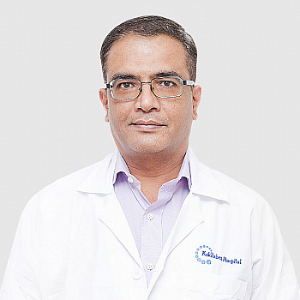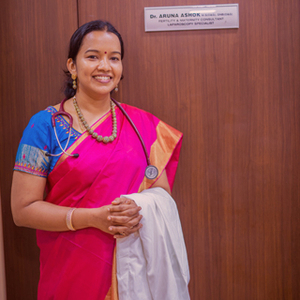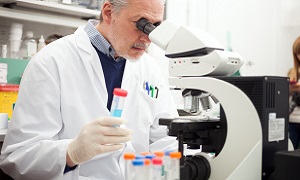Best Doctors in India for Genetic Testing
- IVF Specialist & Gynaecologist, Kolkata, India
- Over 10 years’ experience
Profile Highlights:
- Dr. Moumita Naha is a consultant Gynecologist and Obstetrician in Kolkata.
- Dr. Naha is one of the best infertility experts in Kolkata and has assisted in achieving several successful pregnancies in women with various fertility issues.
- She is an expert in IVF, IUI, ICSI, management of infertile couples, recurrent IVF failure, recurrent miscarriage, endometriosis, reproductive endocrinology, sexual medicine, and Andrology.
- IVF Specialist & Gynaecologist, Bengaluru, India
- Over 20 years’ experience
Profile Highlights:
- Dr. Mahesh Koregol is a well-known gynecologist and obstetrician in Bengaluru with extensive knowledge and expertise in infertility treatment and Reproductive medicine.
- He provides infertility treatment for both male and female patients that includes IVF, IUI, ICSI, TESA, PESA, sperm analysis, etc.
- IVF Specialist & Gynaecologist, Kolkata, India
- Over 10 years’ experience
Profile Highlights:
- Dr. Akanksha Jangid is a Consultant of Gynecology and Obstetrics in Kolkata currently associated with Indira IVF. The center is a highly specialized unit equipped with the latest technology in Assisted reproductive technology together with state-of-the-art infrastructure and laboratories.
- She is trained in infertility treatment and provides services for IVF, IUI, ICSI, and fertility tests.
- IVF Specialist & Gynaecologist, New Delhi, India
- Over 15 years’ experience
Profile Highlights:
- Dr. Arvind Vaid is a well-known Gynecologist and Obstetrician in Delhi specializing in IVF and infertility treatment.
- He has over a decade of experience in the treatment of infertility and has helped a number of patients in having a child through ART (Assisted Reproductive Technology).
- Dr. Arvind Vaid is trained in various infertility procedures including IVF, ICSI, IUI, and assisted laser hatching.
- IVF Specialist & Gynaecologist, Hyderabad, India
- Over 15 years’ experience
Profile Highlights:
- Dr. Chandana Lakkireddi is renowned infertility and IVF specialist in Hyderabad with expertise in all kinds of assisted reproductive techniques and the management of infertility issues in both males and females.
- She has an extensive experience of 15+ years and finds interest in reproductive endocrinology, management of PCOS, implantation failure, recurrent failed cycles of IVF, miscarriage, endometriosis, and adenomyosis.
- IVF Specialist & Gynaecologist, Chennai, India
- Over 10 years’ experience
Profile Highlights:
- Dr. Erika Patel is a Consultant of Gynecology & Obstetrics in Chennai with experience in infertility treatment and ART.
- With several years of experience in the management of infertility and training in IVF, Dr. Patel works with the goal of making IVF and assisted reproduction highly successful in India.
- She has helped several couples in conceiving a baby without compromising on the quality and by following strict ethical conduct while maintaining complete transparency during the entire process.
- Surgical Oncology, Mumbai, India
- Over 22 years’ experience
Profile Highlights:
- Dr. Yogesh Kulkarni is a well-known name in the field of Gynae Onco surgery.
- He holds an experience of more than 22 years and has performed more than 2000 gyne oncological surgeries.
- Dr. Yogesh Kulkarni has performed over 1000 gyne cancer surgeries in the hospital. He also holds the credit for 500 ovarian, 250 endometrial, 214 cervical cancer surgeries, and 144 robotic cancer surgeries at KDAH alone.
- He gained popularity when he performed the first Reported Fertility Sparing Surgery for Cervical Carcinoma on a 4-year-old for clear cell cervical carcinoma
- IVF Specialist & Gynaecologist, Chennai, India
- Over 15 years’ experience
Profile Highlights:
- Dr. Aruna Ashok is a well-known gynecologist and obstetrician with experience in the treatment and management of all types of gynecological issues and disorders.
- Along with that, she is an experienced and skilled infertility specialist with training in various types of assisted reproductive techniques including IVF, IUI, ICI, and IMSI. She performs infertility surgeries and donor insemination surrogacy among other several procedures.
- She has delivered talks and presented papers at national levels on infertility, IVF, and the advancements being made in ART.
- Obstetrician & Gynecologist; Gurugram, India
- Over 20 years’ experience
Profile Highlights:
- Deepa Maheshwari is a Gold medalist gynecologist and obstetrician in Delhi NCR, having more than two decades of experience in assisting Gynae patients.
- The doctor specializes in infertility estimation and management, Antenatal Care, High-Risk Pregnancy, PCOD/PCOS Treatment, Maternal Care, and Prenatal checkup.
- Obstetrician & Gynaecologist, Gurugram, India
- Over 12 years’ experience
Profile Highlights:
- Dr. Neha Gupta is one of the best Gynecologists and infertility specialists in Delhi NCR, having more than a decade’s experience.
- In her 12 years of experience, she gained expertise in Hysteroscopic and Laparoscopic procedures.
- Urinary incontinence, ectopic pregnancy, Pelvic floor repair surgeries, uterine prolapse, uterine polyps, surgeries for fibroids, etc. are her core specialties.
Best Hospitals in India for Genetic Testing
MGM Healthcare, Chennai
- City: Chennai, India
Hospital Highlights:
- Located in Chennai, India, MGM Healthcare is a top multispecialty hospital that provides all medical services under one roof.
- Since its founding in 2019, MGM Healthcare has quickly become a leading national referral centre, creating several innovative flagship initiatives.
- MGM Healthcare combines next-generation medical and digital technologies to provide better patient results.
- With 12 centres of excellence, more than 400 inpatient beds, 100 intensive care unit beds, and 24/7 emergency care, MGM Healthcare leaves no chance in redefining the patient experience in Chennai.
- MGM Healthcare boasts 250+ expert doctors across 30+ departments, including Cardiology, Pulmonology, Neurology, Obstetrics & Gynaecology, and more.
- They house 12 specialized Centres of Excellence, including Neurosciences, Orthopaedics, and Multi-Organ Transplantation.
- Their team of doctors, nurses, and paramedics works together to give every patient individualized treatment.
Genetic Testing
Genetic testing is a procedure for examining your DNA. Your DNA is your chemical database which carries instructions for the functions of the body. Genetic testing can reveal any changes in your genes which can lead to any illness or disease.
Genetic testing is able to provide significant information for diagnosing, treating as well as preventing illness, but there are few limitations. For example, for a healthy person, a positive result from genetic testing doesn’t always mean that you’ll be developing a disease. In some other cases, a negative result doesn’t always guarantee that you won’t have any disorder either.
Talking to your doctor, a medical geneticist or a genetic counselor about what you will do with the results is an important step in the process of genetic testing.
Purpose
Genetic testing plays a very important role in determining the risk of developing certain kinds of diseases. It can also play a significant role in screening and sometimes even in medical treatment. There are different types of genetic testing which are done for different reasons:
Diagnostic testing- If you have symptoms of a disease that may be caused by genetic changes, sometimes called mutated genes, genetic testing can reveal if you have the suspected disorder. For example, genetic testing may be used to confirm a diagnosis of cystic fibrosis or Huntington’s disease.
Carrier testing- If you have a history in your family of a genetic disorder, such as sickle cell anemia or cystic fibrosis or if you belong to an ethnic group having a higher risk of a certain genetic disorder, you can choose to have genetic testing before reproduction. An expanded carrier screening test is able to detect genes associated with a wide variety of genetic diseases and mutations. It can also identify if you and your partner are carriers for the same conditions.
Pharmacogenetics- If you have a particular disease or condition, genetic testing can help in determining what medication and dosage will be effective and beneficial for you.
Presymptomatic and predictive testing- If you have a history of a genetic condition in your family, you can get genetic testing before you show any symptoms. This can reveal if you’re at risk of developing that condition as well. This type of test can be useful in identifying your risk of certain types of colorectal cancer.
Prenatal testing- For women who are pregnant, genetic tests can help in detecting any type of abnormalities in your baby’s genes.
Preimplantation testing- Also termed as preimplantation genetic diagnosis, you can consider this test when you attempt to conceive a child through in vitro fertilization. The embryos are screened for genetic abnormalities. Embryos that are without any abnormalities are implanted in the uterus for achieving pregnancy.
Newborn screening- This is a common type of genetic testing. In the US, all states require newborns to be tested for certain genetic and metabolic abnormalities that might lead to specific conditions. This type of testing is important because if a disorder is detected, treatments can begin immediately.
Preparation
Before you go for genetic testing, it is important to gather information about your family’s medical history as much as possible. After this, you need to talk with your doctor or genetic counselor about your personal and family medical history to understand your risk better. You can ask questions as well as discuss any concerns about genetic testing at the meeting.
If you’re getting tested for a genetic disorder that runs in families, you can consider discussing your decision for undergoing genetic testing with your family.
It is also important to note that not all health insurance policies pay for genetic testing. Therefore, you should check with your insurance provider, if you will be covered.
Procedure
Depending on the type of test you are undergoing, a sample of your blood, skin, amniotic fluid or any other tissue will be collected. It will then be sent to a laboratory for analysis.
Blood sample
Cheek swab
For some tests, a swab sample is collected from the inside of the cheek.
Amniocentesis
Amniocentesis is a prenatal genetic test, where your doctor inserts a thin, hollow needle through your abdominal wall and into your uterus for collecting a small amount of amniotic fluid for testing.
Chorionic villus sampling
Chorionic villus sampling is another prenatal genetic test, where your doctor takes a tissue sample from the placenta. Depending on your situation, the sample may be taken with a tube, also known as a catheter or through your cervix or through your abdominal wall and uterus with the help of a thin needle.
Results
The amount of time it takes for you to receive the results of your test can vary. Usually, it depends on the type of test and your healthcare center.
If the results are positive, that means that they detected the genetic change that was being tested for. If you receive a positive test, the steps you need to take will depend on the reason you had the testing.
If the purpose is to:
Diagnose a specific disease or condition, then a positive result helps you and your doctor to determine the right treatment as well as the management plan.
Find out if you carry a gene that can cause any disease in your child, then your doctor, medical geneticist or a genetic counselor can help you determine how likely it is for your child to actually develop the disease. The test results can provide information which you along with your partner can consider when you make family planning decisions.
Determine if you might develop a certain disease, then you need to keep in mind that a positive test doesn’t necessarily mean you’ll get that disorder. For example, having a breast cancer gene doesn’t indicate that you will certainly be getting breast cancer. However, it means you’re at high risk of developing it at some point in your life. However, with some conditions, such as Huntington’s disease, if you have the altered gene it does indicate that the disease will develop eventually.
Talk to your doctor about what your positive result could mean for you. In some cases, you can make certain lifestyle changes for reducing your risk of developing a disease. The results can also help you make choices related to your treatment plan, family planning, careers as well as insurance coverage.
Plus, you may also choose to take part in research or registries related to your genetic disorder or condition. These options can help you stay updated with any new developments in prevention and treatment.
Negative results
A negative result means that a mutated gene was not detected in your test. This can be reassuring, though it is not a 100 percent guarantee that you will not be having the disorder. The accuracy of genetic tests for detecting mutated genes can vary and it generally depends on the condition which is being tested for and whether or not the gene mutation was identified previously in a family member.
Even if you don’t have the mutated gene, this also doesn’t necessarily mean that you will never be getting the disease. For example, the majority of people who develop breast cancer don’t have a breast cancer gene. It is also noteworthy that genetic testing can’t detect all genetic defects.
Risks
There is generally almost no physical risk in genetic testing. However, prenatal testing such as amniocentesis can sometimes have a risk of pregnancy loss, i.e. miscarriage.
Genetic testing can lead to emotional, social and financial risks as well. Discuss the risks as well as the benefits of genetic testing with a qualified doctor, a medical geneticist or a genetic counselor before you go for genetic testing.














